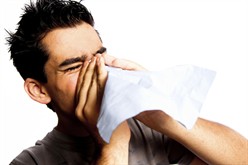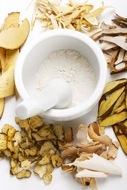Even though it’s cold and flu season, not everyone gets sick. If you’re able to fend off a contagious cold or flu, it may be because you have strong Wei Qi (pronounced “way chee”) according to oriental medicine experts. On the other hand, if you  seem to catch every virus going around, you may have weak Wei Qi.
seem to catch every virus going around, you may have weak Wei Qi.
“Wei Qi is another way of referring to the body’s immune system or first defense against infection,” says Dr. Yihyun Kwon, a faculty member in the acupuncture and oriental medicine program at National University of Health Sciences.
“Oriental medicine looks at respiratory infections like a cold or flu a little bit differently than western medicine,” says Dr. Kwon. “Good health and resistance to colds and flu requires a strong balance between the body’s internal energy and its Wei Qi, or defense against external pathogens.”
According to oriental medicine, each individual’s energy profile is unique. A person’s Wei Qi can have a particular weakness where excess heat, cold, dampness, or dryness create an imbalance in the body. Any one of these excesses can act like a pathogen and make someone more vulnerable to a cold or flu virus.
“Different people are vulnerable to different imbalances of heat, cold, dampness or dryness,” says Kwon. “That difference can also influence your cold or flu symptoms. That’s why some people may get sniffles, sore throat and a fever, while others get a cough and a headache with a cold instead.”
Since each case is different, there is no one single oriental herbal prescription or acupuncture treatment prescribed for every case of cold or flu. An oriental medicine clinician will make a careful diagnosis to determine the exact nature of the energy imbalance in each individual, and prescribe specific herbs that correspond to each patient’s unique imbalance that caused them to contract a cold or flu.
While each person’s health profile is unique, there are measures that everyone can take to prevent a cold or flu. Dr. Kwon recommends common sense precautions like frequent hand-washing, avoiding touching your mouth, nose, or eyes with your hands, good nutrition and plenty of sleep during cold and flu season, drinking plenty of water and boosting your vitamin C  intake.
intake.
There are additional preventive measures that come from traditional oriental medicine. The acupuncture and oriental medicine clinicians at National University recommend the following:
- Try a Qi Gong class as a way to de-stress and support strong and balanced Qi energy in your body, including your Wei Qi, which ultimately boosts your immune system.
- Boil a 50/50 mixture of water and vinegar on your stove for 20-30 minutes, allowing the steam to circulate throughout your home. This will help reduce airborne and surface germs, including mold and bacteria.
- See your acupuncturist for regular acupuncture and moxibustion. Moxibustion is a special technique that uses gentle heat applied to specific acupuncture points to strengthen the immune system.
- Ginger or “Ban Lan Gen” (isatis root) tea are both good to drink during cold and flu season. The teas can be enjoyed several times per day over several months. Be sure to brew them without sugar for greater effectiveness.
- If you are already exposed to a cold or flu, there are many herbal formulas available to defend the Wei Qi and reduce pathogenic Qi. An oriental medicine clinician will customize these formulas for you after a thorough examination.
- If you are experiencing severe flu symptoms, see your primary care physician immediately.
If you’d like more information on oriental medicine for colds, the flu, or other health conditions, or if you would like to schedule an appointment with an oriental medicine clinician at the NUHS Whole Health Center in Lombard, call 630-629-9664. ###




0 Comments